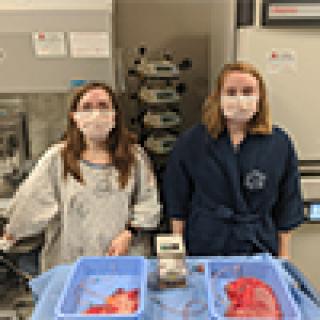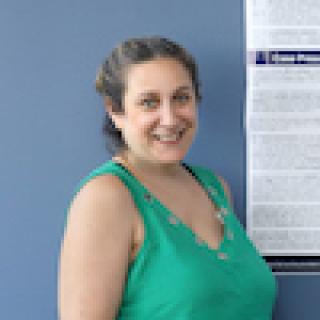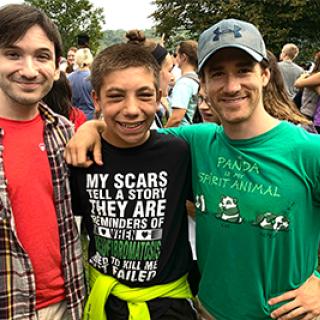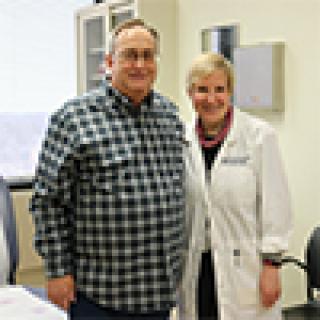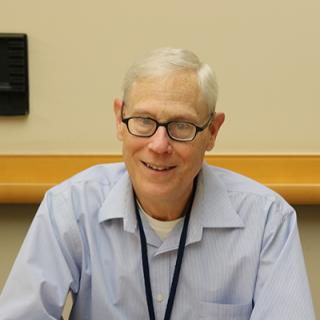Patient Stories
All about the drive: A rare kidney cancer meets its match at NIH
On New Year’s Eve, 2020, Katie Coleman was diagnosed with a very rare form of advanced kidney cancer. She enrolled in a clinical trial led by a collaborative CCR team that gave her the opportunity to have surgery in hopes of removing her tumors.
Read MoreTwo patient’s stomachs kept “alive” after removal in novel study to understand stomach cancer
Two women with genetic predisposition to stomach cancer participated in a clinical trial at the Center for Cancer Research where their stomachs were removed and kept “alive” for several days, allowing the researchers to study the development of cancer and the effects of different therapies in unprecedented detail. The goal is to better study stomach cancer under realistic conditions and find novel, effective treatments.
Read MoreMetastatic breast cancer survivor shares her clinical trial story
We’re celebrating breast cancer awareness month by sharing the story of Samantha Seinfeld, a metastatic breast cancer survivor who participated in a CCR first-in-human clinical trial over 10 years ago. Since then, she has remained cancer-free. Margaret Gatti-Mays, M.D., M.P.H., F.A.C.P., Assistant Research Physician in the Laboratory of Tumor Immunology and Biology, and James Gulley, M.D., Ph.D., Chief of the Genitourinary Malignancies Branch, are currently evaluating Samantha’s unusual immune response in hopes of improving the responses of other patients.
Read MoreNeurofibromatosis type 1 patient attends Camp Fantastic for the first time
Thirteen-year-old Dom was diagnosed with neurofibromatosis type 1 at birth. Because of Dom’s diagnosis, he hasn’t always had the opportunity to do the things the average teenager does, but his first year at Camp Fantastic changed that. Camp Fantastic, an annual week-long camp for pediatric cancer patients and survivors, gave Dom the opportunity to try lots of new things and some familiar ones in a setting of support, safety and friendship.
Read MorePediatric Oncology Branch patient shares neurofibromatosis journey at NIH
Xavier, a patient in the Pediatric Oncology Branch, was born with an incompletely formed leg bone and a large number of dark spots all over his body. When Xavier broke his weak leg at only 11 months of age, he was diagnosed with neurofibromatosis type 1 (NF1). He came to the NIH for treatment, and his tumors have shrunk by more than 20 percent thanks to treatment with selumetinib.
Read MoreA patient’s 10-year journey to moxetumomab for hairy cell leukemia
Randy, a father, husband, engineering quality consultant and lifelong “Motor City” resident, was diagnosed with hairy cell leukemia in 1998 at the age of 41. After participation in a clinical trial at the NIH Clinical Center, his body has shown a complete response to the drug moxetumomab pasudotox, which was developed at the National Cancer Institute’s Center for Cancer Research.
Read MoreFrom father to daughter: A bone marrow transplant for GATA2 deficiency
James and Jahleel are a father-daughter duo from Tennessee who came to NIH for Jahleel’s bone marrow transplant. Jahleel was diagnosed with GATA2 deficiency, a rare genetic disease that causes a wide range of symptoms, including myeloid leukemias.
Read MoreProstate cancer journey leads to immunotherapy
A 14-year battle with metastatic castration-resistant prostate cancer led Tom to the doors of the NIH Clinical Center. A combination immunotherapy clinical trial led by James Gulley, M.D., Ph.D., turned the tide in his fight and led to a passion for advising prostate cancer patients.
Read MoreFighting a rare central nervous system tumor with research and optimism
In January 2016, Sarah Rosenfeld had such severe pain shooting down her legs she couldn’t walk, sleep or care for her young daughters. After weeks of physical therapy for what she thought was sciatica, she had an MRI. Thirty-seven-year-old Rosenfeld learned she had something far worse: myxopapillary ependymoma, a rare cancerous tumor in her spinal cord. She came to the NIH for treatment options and enrolled in a clinical trial with Mark Gilbert, M.D., Chief of the Neuro-Oncology Branch at the Center for Cancer Research.
Read MoreFormer clinical trial patient featured on CBS This Morning
Dr. Jon LaPook, Chief Medical Correspondent at CBS News, recently featured Michael Becker during a segment on CBS This Morning. Becker, who is a former patient of James Gulley, M.D., Ph.D., Chief of the Genitourinary Malignancies Branch, is fighting head and neck cancer caused by the human papillomavirus (HPV). He previously participated in a clinical trial at CCR and has made it his personal mission to spread the word about the HPV vaccine. Watch the segment here…
Read More
